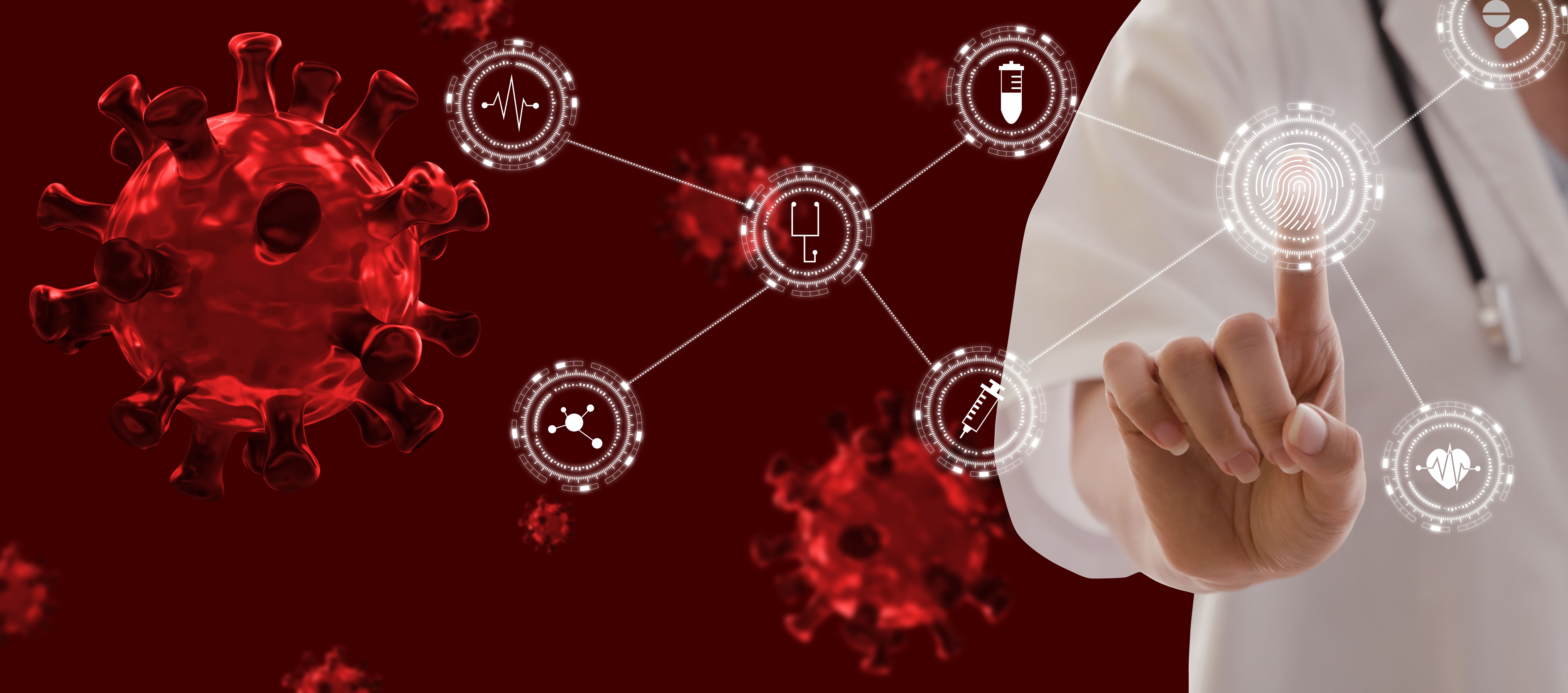The Role of AI in Healthcare: Use Cases That Deliver Real Value
How will AI affect the healthcare industry? Explore its impact on diagnostics, patient care, efficiency, and the future of medical innovation.

Anastasiia Bielousova

Artificial Intelligence (AI) and big data are transforming the healthcare industry at an unprecedented rate. Each year, new breakthroughs demonstrate how these technologies can enhance patient care, streamline hospital operations, and reduce costs. This article examines the evolution of AI and big data in healthcare, their current applications, key benefits, challenges, and potential future developments in this rapidly advancing field.
Defining Artificial Intelligence in Healthcare
Artificial Intelligence in healthcare refers to the application of advanced algorithms, machine learning models, and software systems to analyze complex medical data and support clinical decision-making. According to Wikipedia, AI in healthcare is defined as “the use of complex algorithms and software to emulate human cognition in the analysis of complicated medical data.
AI applications in the healthcare sector encompass tools, systems, and devices that assist medical professionals by analyzing large datasets and providing accurate insights.
Examples of AI applications in healthcare include the following:
- Robot-assisted surgical units
- Diagnostic algorithms for disease detection
- AI-powered drug discovery systems
- Wearable devices that monitor patient health in real time
Although AI remains in the early stages of adoption within the healthcare sector, it has already become indispensable. From cancer diagnostics to administrative automation, modern medicine increasingly relies on AI support.
History of AI in Healthcare
The integration of artificial intelligence (AI) into healthcare began in the 1970s. Dendral, developed at Stanford University, was among the first systems designed to identify unknown organic molecules. Subsequently, MYCIN was introduced to recommend antibiotics for bacterial infections, representing an early application of AI in clinical decision support.
By the 1990s, researchers recognized the necessity for AI systems to incorporate clinical expertise and function effectively with limited datasets. The widespread adoption of electronic health records (EHRs) in the 2000s provided the large-scale data required for the advancement of machine learning models.
In the 2010s, machine learning enabled more accurate diagnostics and predictive healthcare, marking a significant breakthrough. The COVID-19 pandemic further accelerated AI adoption, especially in virus tracking, vaccine development, and remote patient monitoring.
Current Applications of AI in Healthcare
1. Diagnostics
AI systems exhibit high effectiveness in diagnostics, particularly in medical imaging analysis. Traditional radiology methods may miss up to 30% of cancer cases, while AI algorithms can achieve accuracy rates above 95%. For example, South Korea’s LUNIT system detects lung and breast cancers with 97% precision.
2. Robot-Assisted Surgery
Robot-assisted surgeries provide greater precision, are minimally invasive, and enable faster patient recovery. By 2017, nearly 700,000 procedures worldwide had been performed using AI-powered robotic systems. Although these systems are expensive to implement, they are projected to save the U.S. healthcare industry $40 billion annually by 2026.
3. Administrative Automation
AI streamlines healthcare administration by automating scheduling, billing, and patient records management. These efficiencies reduce staff burnout and allocate more time for direct patient care.
4. Personalized Treatment
AI analyzes patient genetics, medical history, and lifestyle factors to develop individualized treatment plans. This personalized approach improves treatment effectiveness and increases patient satisfaction.
Benefits of AI in Healthcare
- Improved efficiency: Automation reduces operational costs and enables healthcare providers to concentrate on high-value clinical tasks.
- Enhanced diagnostics: Accelerated and more accurate disease detection contributes to improved patient outcomes.
- Personalized care: Treatment plans are tailored to the specific needs of individual patients.
- Better patient experience: Chatbots and virtual assistants offer continuous support and help alleviate patient anxiety.
Big Data in Healthcare
Big data forms the foundation of artificial intelligence in medicine. It includes billions of records related to patients, treatments, surgeries, and research outcomes. Manual management and analysis of this vast information volume is unfeasible; therefore, AI plays a critical role.
Key Benefits of Big Data in Healthcare:
- Improved patient care: Facilitating the prediction of disease outbreaks and the optimization of treatment strategies.
- Operational efficiency: Streamlining hospital workflows and supporting research and development activities..
- Drug discovery and innovation: Identifying novel therapies through the analysis of previously unrecognized data patterns.
Challenges of AI in Healthcare
Despite its promise, the adoption of AI in healthcare faces several significant challenges:
- Data privacy and security risks arising from the handling of sensitive patient information.
- Bias and inequity present in AI models that are trained on unrepresentative or skewed datasets.
- Automation bias, which occurs when clinicians rely excessively on AI-generated recommendations.
- High implementation costs, particularly for smaller healthcare organizations.
- Ethical concerns, including accountability, transparency, and patient consent.
The Future of AI in Healthcare
The integration of artificial intelligence (AI) and big data in healthcare is anticipated to yield significant advancements. By 2026, AI is projected to save the healthcare industry up to $150 billion annually through increased efficiency and reduced errors.
The following developments are expected:
- AI is expected to replace certain medical specializations; for example, radiology and pathology are already extensively supported by AI technologies.
- Advanced healthcare applications will function as personal health assistants, monitoring vital signs and recommending preventive measures.
- AI-powered clinical decision support systems will contribute to reducing diagnostic and therapeutic errors.
In the future, physicians may primarily serve as supervisors of AI systems, ensuring that patient care remains accurate, safe, and empathetic.
Conclusion
Artificial intelligence and big data are now essential components of the contemporary healthcare ecosystem. Applications ranging from diagnostics to administrative automation have improved efficiency, accuracy, and patient outcomes.
As technology evolves, the collaboration between AI, big data, and medical professionals will shape the future of healthcare, making it smarter, faster, and more personalized than ever before.
FAQ: Artificial Intelligence and Big Data in Healthcare
1. How is AI used in healthcare?
AI supports diagnostics, personalizes treatment plans, and automates administrative tasks in healthcare. For instance, AI systems analyze medical imaging to detect cancers with greater accuracy than traditional methods. Additionally, AI enables robot-assisted surgeries, predictive analytics, and virtual health assistants, which enhance patient engagement and reduce costs.
2. What is the role of AI in healthcare?
AI enhances efficiency, accuracy, and patient outcomes in healthcare by leveraging big data and machine learning. It supports physicians in decision-making, reduces diagnostic errors, and enables personalized patient care based on individual medical histories.
3. What is the role of AI in healthcare today?
Currently, AI provides real-time support for clinicians and patients. It assists with disease detection, treatment planning, and hospital operational management. AI also contributes to drug discovery, predictive health monitoring, and reducing administrative burdens for medical staff.
4. How will AI affect the healthcare industry?
AI will impact the healthcare industry by improving diagnostic accuracy, reducing treatment costs, and enabling personalized medicine at scale. It will also transform hospital operations, support preventive care through wearable devices, and accelerate research into new drugs and therapies.

.jpg)
.jpg)
%20(1).jpg)